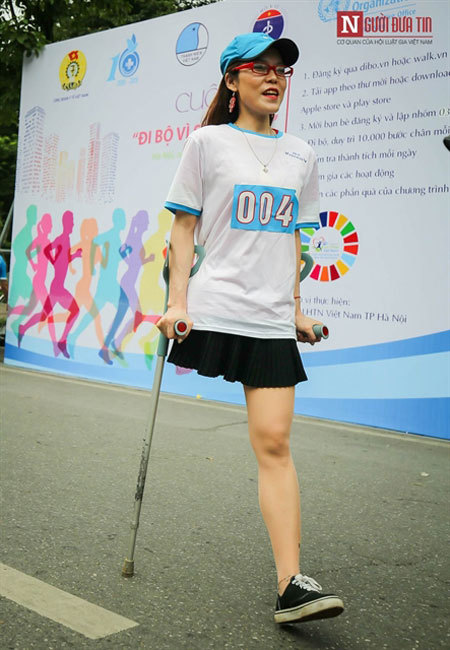Vietnamese disabled given a chance at work
Deaf mute teacher eagerly promotes arts among handicapped children
Online map for disabled people
 |
| Be Thi Bang took part in a walk in Hanoi on June 23 as part of the launch ceremony for the “Walk for your health” competition. — Photo nguoiduatin.vn |
Seven years ago, Be Thi Bang woke to find herself strapped to a hospital bed.
Seeing a nurse nearby, Bang called out and asked for help to pull her right leg up because she couldn’t feel it. The nurse came close, telling Bang that she didn’t have a right leg.
Four days earlier, while riding her motorcycle, Bang had been hit and injured so badly by a truck that doctors had to amputate it.
Bang, a native from the northern mountainous province of Cao Bang who had climbed metaphorical mountains to make it in life, was a 25-year-old dentist and full of life.
The tears started to fall. However, her survival instincts soon kicked in.
“I’m still alive, isn’t that good enough?” she told herself, trying to overcome the despair she felt.
After a while, a doctor asked her if she wanted to see anyone – her family and friends were waiting outside.
She didn’t want to see her parents.
“I felt so guilty – I’ve always wanted to make money to help them because they had a very hard life – now what?” she said.
The next day, she’d overheard a doctor telling her family just outside her room that she only had a 5 per cent chance of survival.
“No, my daughter won’t die!” – was what her dad said.
Her dad was not making a statement of hope. In his eyes, Bang was the strongest person he had known.
When she turned seven, her grandmother fell very sick and was paralysed. Her parents, who were State employees, had to spend much of their income buying medicine. There was nothing much to eat for the whole family, and Bang, who was the eldest of three children, was always the one who ate only the scorched rice left in the pot with ginger, chili and salt, and saved the best food for the rest of the family.
Bang was also the one who took care of her sick grandmother most of the time since her parents had to work, and her grandfather was too old. The skinny little girl would feed her grandmother and clean her body every day, for eight years, until the grandmother’s death.
Bang also worked in the field from an early age, helped harvest the rice, and herded the family’s buffalo.
Her dad – who knew her best, believed that she wouldn’t give up. Why should she?
Standing up
Twenty-one days after the accident, Bang was discharged from the Viet Duc Hospital in Hanoi. With no money, Bang asked her parents to go back home in Cao Bang Province.
She couldn’t let them sell the rest of their property.
When her parents said they wouldn’t go home, she said: “I will bite my tongue and die if you stay.”
Bang asked a nurse to come to her rented apartment every day to take care of the wounds. As she wasn’t able to stand up or walk, every two weeks, her younger sister would bring her “food” – some water and milk. She couldn’t eat much after the amputation and the colostomy – she had to wear a colostomy bag for six months before a reversal surgery could be done.
When her sister was too busy, Bang would not eat for several days.
A month after being discharged, she decided it was time she sat up and learned to stand and walk again.
“When I touched my back I could feel it getting flat and my left leg was atrophied, I couldn’t live my life like that,” she said.
Her first attempts to stand up on one leg, holding on to the bed were very painful. She cried and fell repeatedly.
“Many times, when my sister came, she would find me lying on the floor, and she would cry,” Bang recalled.
Bang then called the truck driver and asked him to buy her a pair of wooden crutches. He was eventually sentenced to 36 months under supervision.
She asked her friend, a tailor, to make her some long dresses to cover the lost leg. She had to find work again.
When she had the accident, she quit her job at a dental clinic. She thought she couldn’t go back there and ask for a job – it might be awkward for both her and the employer.
After several failed attempts, going from clinic to clinic on public buses, a doctor took her in, on one condition – that she worked for free.
“They were afraid I couldn’t do anything and just accepted me out of pity, I think.
“But seeing that I could actually work, they started to pay me.”
Bang said being a person with disabilities was not as hard as facing the stigma.
"Individuals with disabilities like me are faced with stigma and discrimination from the society. But we can actually do anything like anyone," she said.
She also joined an association for people with disabilities, where she took part in activities like making handicraft items and supporting those in need. She joined a special sports club and learned to throw the javelin.
“I think I got my stubbornness and strong spirit from my grandmother, who was very strong and very loving, who worked from dawn ‘till dusk to feed the family,” Bang said.
Back home
Ten months after the accident, Bang decided she would go home on her mom’s birthday.
When the bus arrived at five in the afternoon, her mom was waiting with an old bicycle. The ride home was difficult, but the three-day visit assured her parents that she could take care of herself.
On another visit, her mother asked Bang one morning to come up to the house’s terrace and see the dawn.
As she saw her shadow on the floor, Bang moved her hands and arms and saw graceful movements. It made her think of dancing, something she’d always loved.
 |
| Dancing while wearing a high heel? Not a problem for Bang these days. — Photo courtesy of Be Thi Bang |
She let go of her crutches and started to move her body. She fell several times, had several bruises, but had found her passion.
The next morning, Bang went up to the terrace again and danced. She did so the next morning, too.
Back in Hanoi, she practised dancing, alone. Then she filmed herself and uploaded the videos to her YouTube account, where she received encouragement and compliments.
A loving accident
Sometime later, Bang had just seen off a friend at Noi Bai Airport when she saw a foreigner looking clueless at the taxi stand. She asked him if he needed some help. They soon parted, without knowing who the other was.
A few days later, they met again as they were walking on the banks of West Lake. This time, they talked and became friends. The German, Oturak Be, who was on a vacation, asked her to guide him around the city.
“When I first saw Bang at the airport, I couldn't see she was wearing a prosthetic leg. But I could immediately see she was a woman with a strong mind.
“I felt like I’d known her for a very long time,” he said.
When he left Hanoi, he told Bang that he had feelings for her. He returned twice to see her and proposed to her on his third visit.
Bang told him she was not worthy. “Worthy is not a good word,” he told her.
“You are a person with dignity, honesty, intelligence and beauty. You deserve everything.”
They got married in 2017, when Bang was in the middle of a contest called 'Vầng trăng khuyết' for people with disabilities. Her friends had encouraged her to sign up for it to inspire others.
To the couple’s surprise, she won the contest a few weeks ago. But that also meant she had to delay her visit to Germany with her husband.
However, he knew she needed the freedom to do what she needs to do – taking part in charity activities and inspiring people like her.
“There are uncountable things that she still can do, and I am sure she will do them.”
Thu Van
VNS
 In the last few weeks, a young woman was crowned champion of a talent contest, winning over the judges and inspiring thousands of viewers with her story.
In the last few weeks, a young woman was crowned champion of a talent contest, winning over the judges and inspiring thousands of viewers with her story.